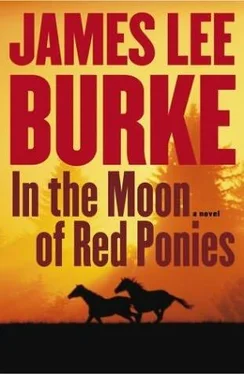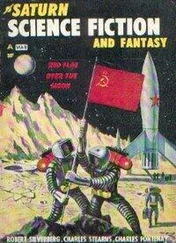James Burke - In the Moon of Red Ponies
Здесь есть возможность читать онлайн «James Burke - In the Moon of Red Ponies» весь текст электронной книги совершенно бесплатно (целиком полную версию без сокращений). В некоторых случаях можно слушать аудио, скачать через торрент в формате fb2 и присутствует краткое содержание. Жанр: Полицейский детектив, на английском языке. Описание произведения, (предисловие) а так же отзывы посетителей доступны на портале библиотеки ЛибКат.
- Название:In the Moon of Red Ponies
- Автор:
- Жанр:
- Год:неизвестен
- ISBN:нет данных
- Рейтинг книги:5 / 5. Голосов: 1
-
Избранное:Добавить в избранное
- Отзывы:
-
Ваша оценка:
- 100
- 1
- 2
- 3
- 4
- 5
In the Moon of Red Ponies: краткое содержание, описание и аннотация
Предлагаем к чтению аннотацию, описание, краткое содержание или предисловие (зависит от того, что написал сам автор книги «In the Moon of Red Ponies»). Если вы не нашли необходимую информацию о книге — напишите в комментариях, мы постараемся отыскать её.
In the Moon of Red Ponies — читать онлайн бесплатно полную книгу (весь текст) целиком
Ниже представлен текст книги, разбитый по страницам. Система сохранения места последней прочитанной страницы, позволяет с удобством читать онлайн бесплатно книгу «In the Moon of Red Ponies», без необходимости каждый раз заново искать на чём Вы остановились. Поставьте закладку, и сможете в любой момент перейти на страницу, на которой закончили чтение.
Интервал:
Закладка:
He let his hands hang between his thighs and stared at the sidewalk. Then he gathered up his crutches and got to his feet. “Tell Miss Temple I’m sorry. And you go to hell, counselor,” he said.
With that, he stepped off the curb into the traffic, jaywalking across the street to a cafe, jabbing a crutch into the door of a taxi that had blown its horn at him.
I could afford to pay Lucas’s board and tuition at the university, where he had the improbable double major of music and dairy husbandry, but he would not allow it. Instead, he played several gigs a week at nightclubs and sometimes waited tables while carrying eighteen academic hours. His schedule took its toll, and often he was tired and barely able to stay awake when he came to dinner at our house.
But on Friday afternoon he was beaming as he came into my office.
“Win the lottery?” I asked.
“Pert’ near,” he replied, taking a torn envelope from his back pocket. “I got a full scholarship, all tuition and out-of-state fees paid, plus five hundred dollars a month living expenses.”
“How you’d pull that off?”
“Applied for every kind of financial assistance they got. This one just happened to come through.”
He handed me the awards letter. It was written on gold-and-silver-embossed stationery and was from a group called the Rocky Mountain Educational Foundation in Denver. “That’s great, Lucas,” I said.
“I’m taking y’all to dinner. The Golden Corral has got all-you-can-eat fish tonight,” he said.
“Sounds swell,” I said.
“Want to ask Johnny and Amber? I reckon they’re feeling pretty low these days.”
“I’m not Johnny’s attorney anymore.”
“Y’all have a blowup or something?”
“Johnny has his own time zone. I need to stay out of it.”
“You used to tell me a guy can have all the friends he wants when he’s in tall cotton. You always said your real friends are the ones who stick with you in hard times. When did you change your mind?”
A week passed and still Johnny had not been charged in the death of Seth Masterson. I busied myself with other cases, fished in the evenings, and thinned out the trees and undergrowth around our house as we entered the fire season.
At sunset the heat rose from the ground and broke up in the wind, but even though the nights were clear and the stars bright, we could smell smoke lingering on the hillsides and see the glow of forest fires burning out of control in Idaho.
On the Fourth of July, Temple and I attended the Indian rodeo and powwow up on the res, ate buffalo burgers, fried bread, and snow cones, and watched hundreds of ceremonial dancers in heavy, feathered regalia perform in ninety-five-degree shade. I was sure I saw Johnny and Amber in the crowd, but when I waved they showed no sign of recognition.
Perhaps it was the heat and dust and the constant pounding by the elders on a giant rawhide drum, but I felt like a interloper at the ceremony, an effete sojourner little different from the tourists whose chief interest was buying Indian jewelry as cheaply as possible. After the dance ended, I tried to catch sight of Johnny and Amber amid the concession stands or by the rough stock pens adjacent to the bucking chutes.
Instead, I saw Wyatt Dixon perched atop a slat fence, his bad leg supported precariously, a solitary crutch balanced on his loins. His bare arms were red with sunburn, his face shaded by a white, lacquered, high-crown hat he wore low on his ears. He looked at me momentarily, then made a snuffing sound in his nose and turned his attention back to a couple of wranglers trying to load a bull onto a cattle truck.
I didn’t think Temple had seen him and I made no mention of his presence. But very little escaped her eye. “What’s with Dixon?” she said later.
“Nothing.”
“Don’t lie.”
“He came to see me a week ago. He’s got some notion I’m a river-baptized crusader or something. He said to tell you he was sorry for what he did.”
“You believe this guy’s horseshit?”
“No.”
“Then don’t tell me about it.”
We were in the parking area now. The air smelled of livestock and heat and dry manure, and the sun was red and veiled with dust over the western hills. “I can’t keep him from coming around,” I said.
“I can,” she said. “He’ll be the deadest ex-convict in the state of Montana.”
“Why are you so angry?”
“Because Dixon can read you like a map. Your causes come before your family. Sometimes you break my heart.”
We drove home in silence. I believe it was the worst Fourth of July in my life.
The next morning was Saturday and I got up before Temple did, packed a lunch, and drove up Rock Creek, which is rated by outdoor magazines as one of the ten top trout streams in the United States. But I didn’t fish. In fact, I was not even sure why I was there, except for the fact the morning was cool, the woods deep in shadow, the riffle flowing over a smooth, pebbled creekbed streaked with green moss.
Soon I was back into my old, futile habit of trying to think my way out of conflict or worry. There was no doubt that Dixon had set the hook, either consciously or by accident. I was baptized at age nine under a canopy of hardwood trees that were turning to flame against the blue outline of the Ozark Mountains. The preacher who leaned me back under the water had a face like a horse and teeth like barrel slats. The water was spring-fed and cold, and my skin burned as though it had been held over a cool fire. I broke the surface gasping for air and my father wrapped me in his World War II Army shirt, one with an Indian-head Second Division patch on the sleeve, while the preacher clog-danced on a wood platform, Bible in hand, and the congregation thundered out “I Saw the Light.”
But perhaps the ritual was less important than what the preacher told me afterwards, or at least as I recall his words: “You done been joined in spirit to God, to earth, to sky, to water and trees. Jesus is your light, your sword and shield. There ain’t no place in his kingdom you don’t belong. You ain’t never got to be afraid again.”
But I cannot say my baptism made me a good Christian. I know for certain L. Q. Navarro and I killed at least seven men. I believe they deserved what they got and the world is a better place without them. But my latent desire for violent recourse did not die with them. The Hollands were violent people, going all the way back to our patriarch, Son Holland, who fought against Santa Anna at the Battle of San Jac-into. The penchant in our family for red-black rage and the shedding of blood lay as strong a claim on our souls as a genetic desire for alcohol. Except that drunkards are consumed by their own energies. The Hollands were not.
A helicopter flew by overhead, low over the canopy, filling the canyon with the roar of its blades. I watched it tip upward into the sunlight, climbing abruptly over a wooded hill, then circle back toward me, the pilot as tiny as a bug inside the Plexiglas. Deer and a moose spooked out of the trees, clattering over stone, then the helicopter lifted once again over a hill and was gone.
It was after 8 A.M. I called home on my cell phone, but Temple didn’t pick up. A family in a campground was cooking breakfast, and an old man and a young boy who was probably his grandson were fishing in a pool behind a beaver dam, the current cutting around the tops of their waders. The old man helped the boy unhook a rainbow and put it in his creel, then the two of them walked up on the bank and joined their relatives in the campground.
I thought of my own father and mother, both gone now, and the town in the Texas hill country where I had grown up, a place of green rivers, fried-chicken picnics, and downtown streets that still had elevated sidewalks with tethering rings set in them. I fed my packed lunch to a family of red squirrels and walked back toward my truck. The mystics may have found solace in the meditative life, but I think there are days when memory and solitude are not one’s friend.
Читать дальшеИнтервал:
Закладка:
Похожие книги на «In the Moon of Red Ponies»
Представляем Вашему вниманию похожие книги на «In the Moon of Red Ponies» списком для выбора. Мы отобрали схожую по названию и смыслу литературу в надежде предоставить читателям больше вариантов отыскать новые, интересные, ещё непрочитанные произведения.
Обсуждение, отзывы о книге «In the Moon of Red Ponies» и просто собственные мнения читателей. Оставьте ваши комментарии, напишите, что Вы думаете о произведении, его смысле или главных героях. Укажите что конкретно понравилось, а что нет, и почему Вы так считаете.












